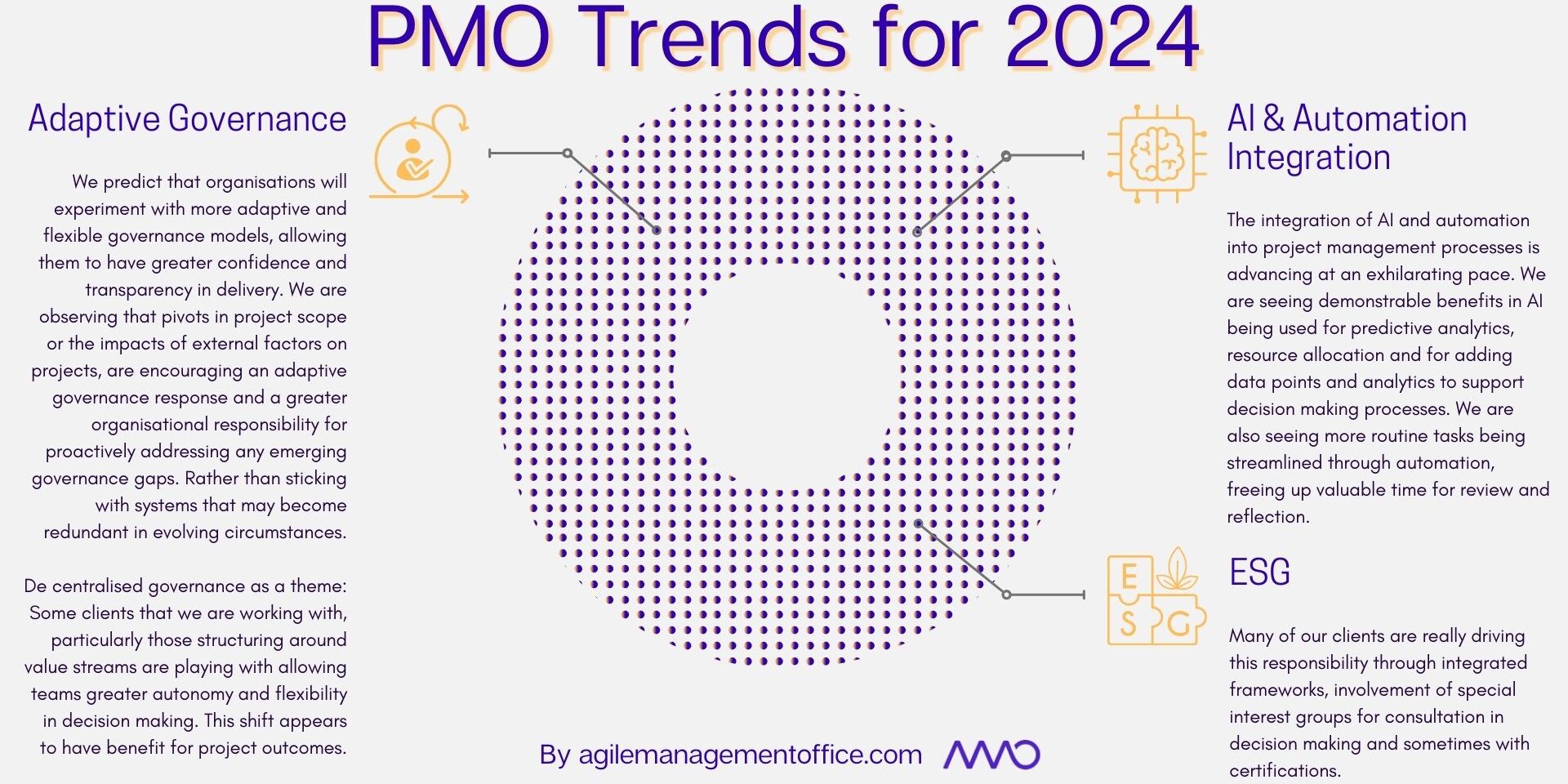As 2023 draws to a close, it’s a moment for reflection, both on a global scale and within the realm of project management. The past year has seen economic and political uncertainty. Yet, amidst the challenges, we’ve also witnessed tremendous growth, opportunity, and innovation.
To set the stage for what follows, it’s essential to provide context within the current landscape of AMO operations.
The projects we engage in are shifting in nature quickly, driven by the rapid acceleration of digitalisation, with a particular focus on AI and automation integration.
Remote work of course is standard, but it’s clear that there is room for improvement in optimising the tools and processes that facilitate sustainable remote collaboration and, importantly, in preserving a sense of connection and unity within teams.
Our ongoing challenge lies in striking the right balance between creating governance structures that are agile enough to meet regulatory and operational requirements and respond to the growing call for greater autonomy and decentralisation in the governance approach.
Ok, so that’s our context, let’s get into some of our key predictions for 2024!
AI and Automation Integration
The integration of AI and automation into project management processes is advancing at an exhilarating pace. We are seeing demonstrable benefits in AI being used for predictive analytics, resource allocation and for adding data points and analytics to support decision making processes. We are also seeing more routine tasks being streamlined through automation, freeing up valuable time for review and reflection.
We are closely tracking advancements in AI, specifically for project scheduling and optimising task sequencing, budgeting, and cost management and in data visualisation and reporting. We see this as been an area that will play a big part in shaping our future product and service offerings.
A challenge that we would like to highlight for the project delivery community is the need to prioritise and allocate time for strategic thinking about AI and the necessary skills development essential for maximising its benefits. This can be demanding, especially in the midst of often relentless project delivery schedules.
In terms of trends for 2024 however most would agree this one is a no brainer!
ESG
Organisations recognise the need to address sustainability, social responsibility, and governance issues. Continuing into 2024 we expect to see more advancement in how ESG considerations are integrated into project delivery processes. We anticipate more ESG focused monitoring through KPIs, reporting and assessment.
Many of our clients are really driving this responsibility through integrated frameworks, involvement of special interest groups for consultation in decision making and sometimes with certifications.
Also of note is the impact of ESG in driving project design, through the incorporation of sustainability principles in design, through, for example, energy efficient technologies and practices designed to minimise negative environmental impact. We are also seeing a trend toward ‘circular economy projects’ where organisations are directing investment prioritisation towards those products and resources that can be reused, recycled, and repurposed.
We are looking forward to seeing how projects integrate ESG considerations and evolve delivery practices to give the right amount of prominence and focus.
Adaptive Governance
We predict that organisations will experiment with more adaptive and flexible governance models, allowing them to have greater confidence and transparency in delivery. We are observing that pivots in project scope or the impacts of external factors on projects, are encouraging an adaptive governance response and a greater organisational responsibility for proactively addressing any emerging governance gaps. Rather than sticking with systems that may become redundant in evolving circumstances.
Some interesting developments are being observed. For example, at a stakeholder level, is it ok to be passive in engaging with project teams? How much does the Project Manager ‘owe’ you in terms of giving you information to fulfil your governance responsibilities and how much do you need to self-serve? Assuming of course that a good governance eco system exists for you to self-serve from! Passivity in the governance eco system, which includes partners, suppliers and internal stakeholders is receiving a fair challenge. Such an interesting debate around responsibility in the context of complex organisations and projects.
De centralised governance as a theme. Some clients that we are working with, particularly those structuring around value streams are playing with allowing teams greater autonomy and flexibility in decision making. This shift appears to have benefit for project outcomes.
Data driven governance outcome. We are noticing maturing demands from governing bodies and project managers for data and analytics, to assess project progress, understand risk and make informed and evidenced decisions. This trend will lead to more data centric governance structures, which will likely impact cadence, forum memberships, and responsibilities over-time.
All in all, governance is expected to see a bit of a shake up in 2024, with data and responsibility being central to this shift.
Thanks for engaging with this content. We hope that we have left you with something that resonated and that perhaps you can use this as a springboard to be curious about how these predictions may impact your unique operating environment.
If you have any of your own observations, we always love to hear from you, so please reach out.
Want to find out more about how AMO can help with your project management capability? Have a look here (https://agilemanagementoffice.com/consult/) how our team can help yours reach their full project management potential. If you want to know more, contact us on contact@agilemanagementoffice.com
